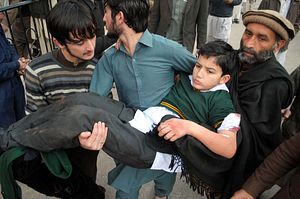The heartbreaking attack on Army Public School by Tehreek-e-Taliban Pakistan (TTP) was a brutal reminder to the Pakistani establishment of the repercussions of the treacherous policies they have been pursuing. Prime Minister Nawaz Sharif immediately announced that no distinction would be made between “Good Taliban” and “Bad Taliban.” India’s demand is that Pakistan go beyond the Taliban and take on Punjab-based terror outfits like Lashkar-e-Taiba (LeT), which make no secret of their designs for India.
The expectation that Pakistan will end its policy of differentiation between terror groups like TTP and “strategic assets” like LeT is a little naive. GHQ Rawalpindi and ISI continue to have a symbiotic relationship with groups like LeT and Haqqani Network. These strategic assets are considered, by many experts, to have derived from historical imperatives and geo-political constructs that embattled Pakistan. While partially true, the relationship that the Pakistani establishment has with “good terrorists” has essentially to do with what Pakistan deems itself to be – an Islamic nation with a missionary zeal that borders on and flirts with fanaticism.
Like many other states in West Asia, Pakistan has not been able to reconcile its Islamic ideology with the Westphalian construct of the world of which it is a part. The Westphalian model of sovereignty that evolved from the Peace of Westphalia that ended the Thirty Years’ War (1618-48) created a multiplicity of states often founded on contradictory philosophies yet balancing each other. The birth of Pakistan necessitated a politico-religious project as a means to justify its existence as a nation distinct from India. Islam – which justified the creation of Pakistan – provided an identity for its sustenance and Pakistan embraced it immediately.
The institutions in Pakistan were deliberately and sometimes artificially coloured with Islamic ideology. The entire nation was on a mission to bolster its identity and ensure that it is devoid of any Indian influence. The impetus that this mission received waxed and waned through the history of independent Pakistan but a running thread of Islamic construct, quite at odds with the Westphalian model, has persisted. Its ambitions in Afghanistan and the desires to be the Islamic nuclear power, which it eventually did become, only reinforced the inherent tension between Islamic ideology and Westphalian world order.
One of the greatest manifestations of this tension is found in Pakistan’s education system. In a 2013 paper, Tufail Ahmad of the Middle East Media Research Institute pointed out the systematic distortion of history, social and religious studies in Pakistani textbooks aimed at resolving the identity crisis of Pakistan. The textbooks instill in students, sometimes quite radically, a spirit of jihad as an inextricable part of Pakistan’s Islamic credos. The books spew venom against Hindus, Jews and Christians and the same curriculum is forced on non-Muslim students.
The textbooks eulogize Muslim invaders like Mehmood Ghaznavi and Muhammad Ghori. The former is known for invading India seventeen times and plundering Hindu temples. The latter is known for defeating Prithviraj Chauhan in his second attempt. It is no coincidence that three of Pakistan’s ballistic missiles are named Ghaznavi, Ghori and Abdali, after three prominent Muslim invaders of medieval India.
Consider some of the statements in Pakistani textbooks: “Hindu has always been an enemy of Islam”; “Hindus worship in temples which are very narrow and dark places, where they worship idols”; or “[Christian] missionaries thought that if they could defeat Muslims, there would be no other religion that could take a position against them.” In Punjab province, Urdu book for Grade 5 teaches, “A selfish Jew was the owner of a well and he never allowed Muslims to take water from it (Page 32); Do you like it that we remain under these infidels (Page 56).”
If you think the story could not be grimmer, then consider the madrassahs where students are trained to be pesh imams, khateebs and madrassah teachers. A book by a Pakistani journalist Babar Ayaz, What’s Wrong With Pakistan? informs us that there are 12,448 madrassahs with 1.6 million male students in Pakistan (2010 data). Babar Ayaz, quite wistfully, adds, “…the system is producing one mullah for every 225 Pakistanis every year. It is in sharp contrast to one nurse for over 3,600 persons, and one doctor for some 3,400 persons.”
Islamic ideology is not just manifest in Pakistan’s education system, but in other institutions as well, including the judiciary, political parties, and of course the Army. This doesn’t even take into account the scores of terror camps that operate on Pakistani soil, many under the watchful eyes of ISI.
Even if Nawaz Sharif is sincere and powerful – and there are reasonable grounds to have doubt on both counts – mere statements will change nothing. The politico-religious project of Pakistan has embedded its institution with Islamic tenets that have become an impediment to freeing the country from radical Islamic groups. Pakistan needs a detoxification that is absolute and indiscriminate. Any attempt at selective riddance will only exacerbate the festering wounds that are now seriously troubling the Islamic Republic of Pakistan.
Kunal Singh is a Research Associate at the Centre for Policy Research (CPR). Follow him on Twitter@kunaldrajput.

































